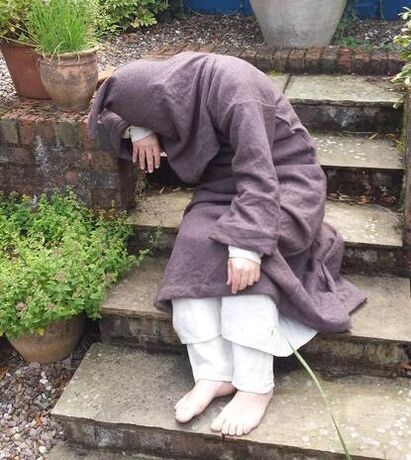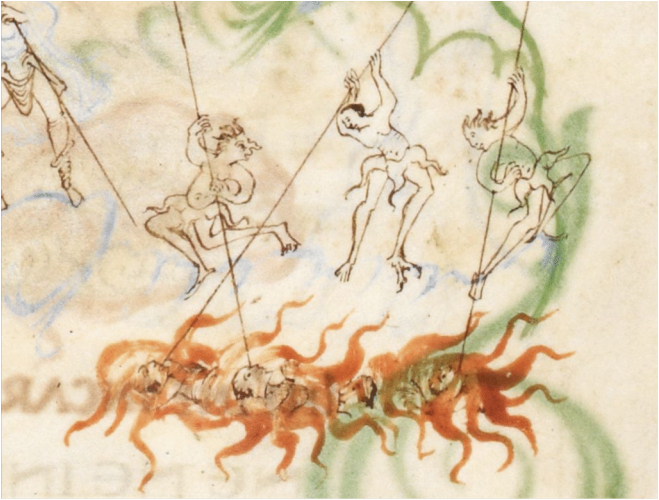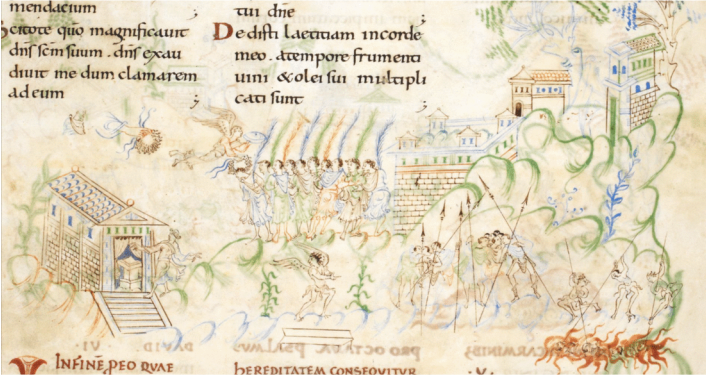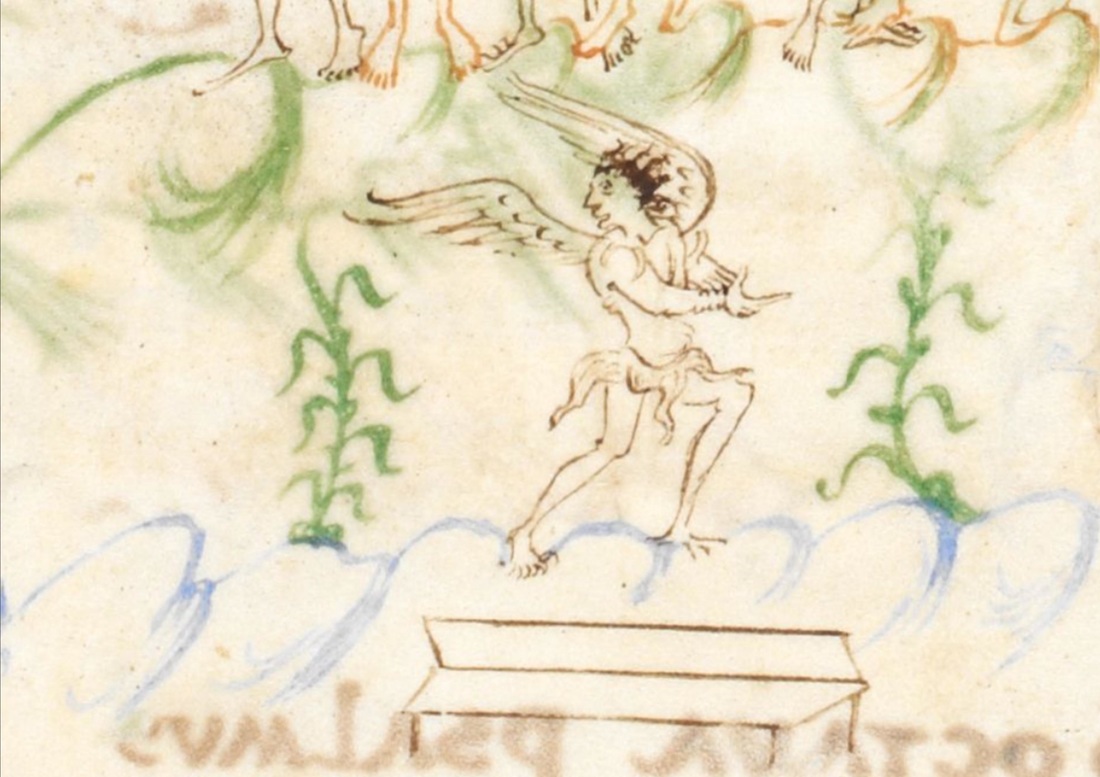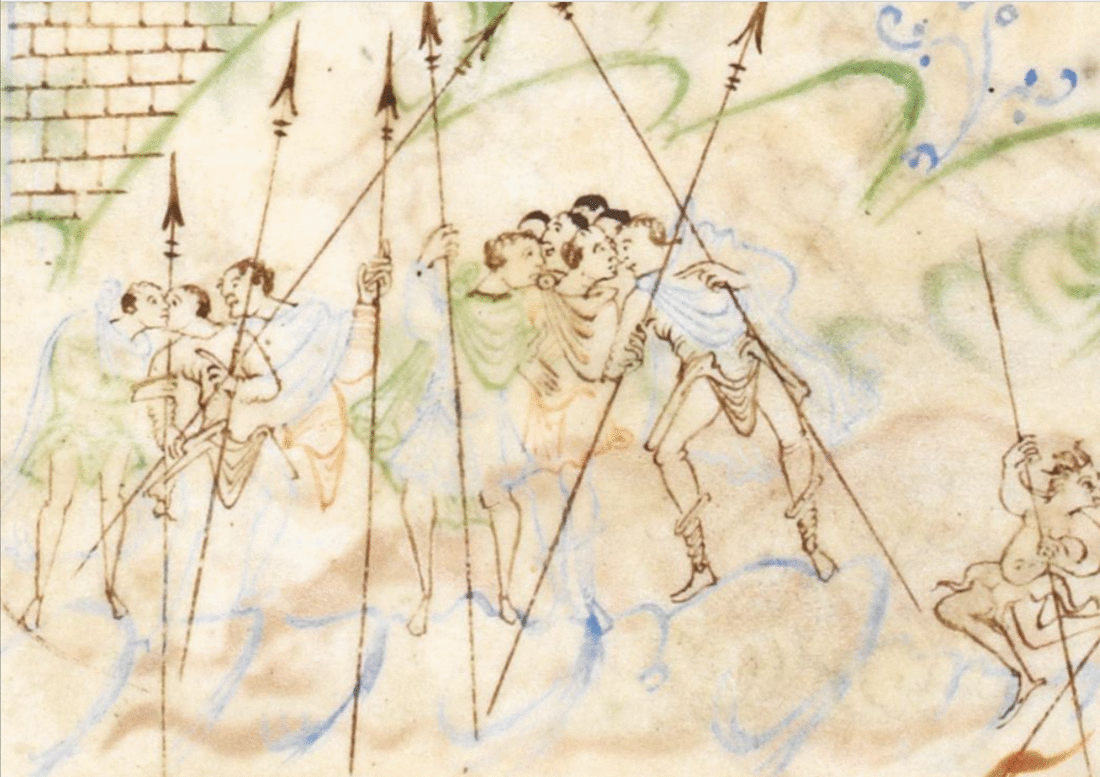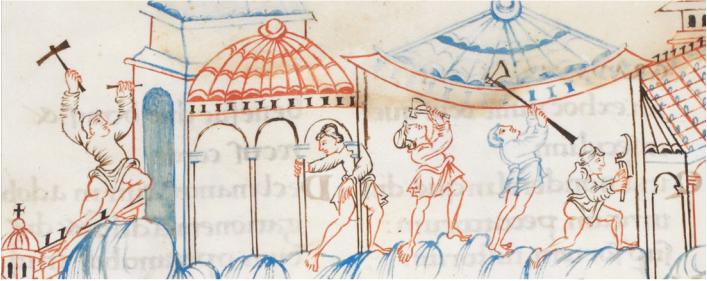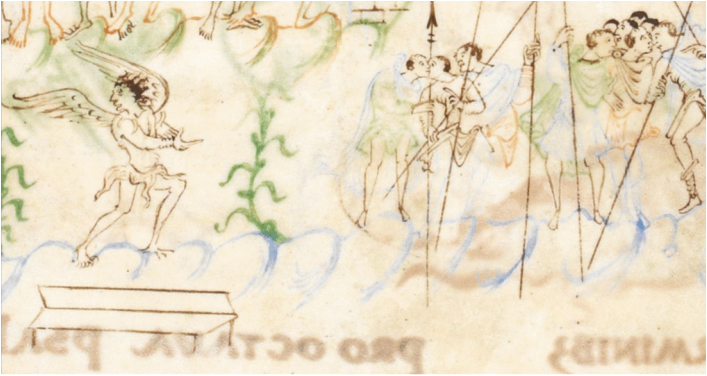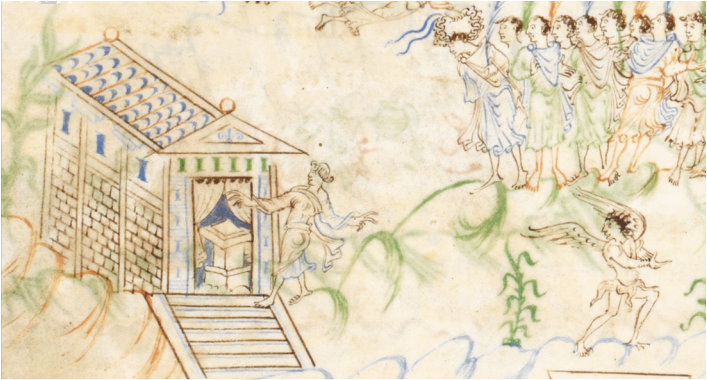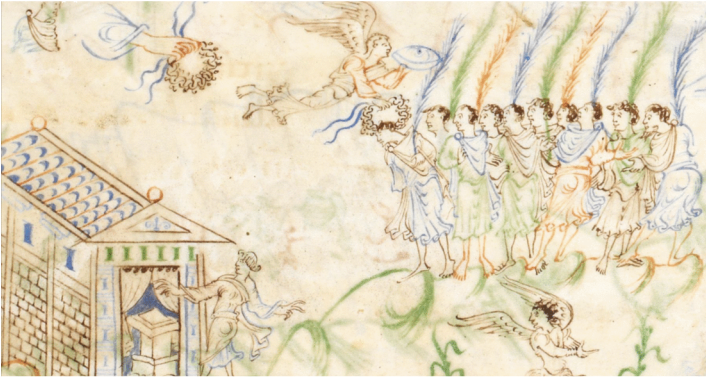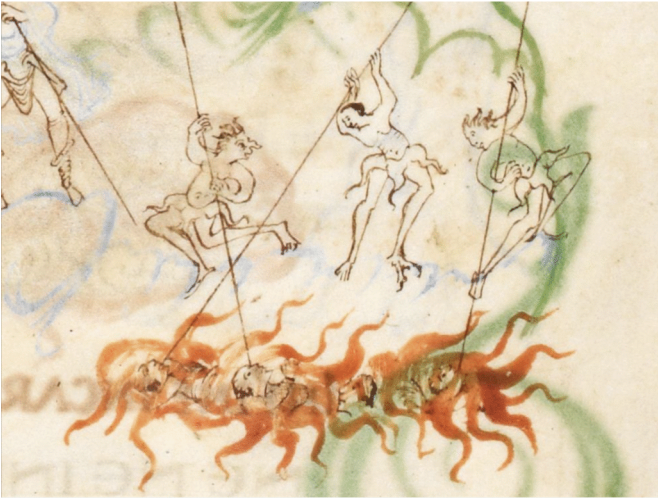Blessed readers, It is that time again. Time to cease your physical labours and join me in the quest for spiritual enlightenment via the Anglo-Saxon medieval treasure known as the Harley Psalter. So gird up your loins once more and get ready to play medieval charades. Psalm 5 is one of my favourites. I like its clear cut message. I promise you that by the end you will have no doubt as to what is right and wrong. Isn't that what we all want? Unlike some of the previous charades, I'm not going to start with the Lord. But with this fellow: Now just follow his lead, though not his example. What I mean is: note where he looks and where he points. Two different directions. Quite the charade expert, this winged being! If you look at the whole of Psalm 5 in the picture above, you'll notice he's watching a man entering a building, whilst also pointing towards a group of spear-wielding, tunic-clad men. Before we identify those two elements, please be advised: a pair of wings does not make you an angel. No, for this spirit creature is from the dark side. If you haven't learned by now what ratty hair and a correspondingly shabby tunic signify, then may the Lord show mercy on your lack of spiritual advancement. (Please see Medieval Charades 1: link below.) So to those spear wielders! What a disreputable huddle of men. You can see the clues, I know you can. Heads together, leaning in on each other, gesticulating index fingers... and just what are they doing with their tunics? That tucked-up look, beloved, is not an eleventh-century fashion statement. No, it's what men did when they were labouring, as can be seen from another picture in the Harley Psalter: So our huddling men are workers of sorts, it would seem. But what work are they carrying out? They just look like they're having a good old natter! We must be missing something... Aha! We overlooked the open sepulchre under the devil's feet. How could we be so careless? Yes, that stone sarcophagus we see must be a visual metaphor for the behaviour of the men. Since they are nattering, nay gossiping, even conniving, its open lid must symbolise the nature of their wicked talk. Why, of course! Their throat is like an open sepulchre; it's as if their collective mouth spews forth nothing but corruption; they speak a lie! Now that should give us a clue to the kind of workers these men are; why, it's so obvious isn't it? All that huddling makes sense now. They're quite simply workers of iniquity. Never trust a huddle of scantily clad men, that's what I say, blessed charadees. Never! Now that we've got the first element sorted, the second is a walk in the park, as you twenty-first century folk would put it. Perhaps a wander through the wild wood is more appropriate... or maybe a foray into deep, dense forest? I digress. What a remarkable fellow this is. It matters not that the wicked demon is staring at him, our psalmist. He skips down those green rocks like a sprightly mountain goat, leaps onto the steps like a levitating gymnast (such elegant arms and great posture), and heads straight for the entrance to... of course, the house of the Lord, his holy temple! Now I want no snide comments about the wonky walls. These are spiritual dimensions, not earthly ones. The truly appropriate and Christian response to this image is: what has the Psalmist atop his head? No! It is not a new fashion in tonsures; let's not be silly. To find the answer, we need to observe more closely whence the psalmist has come . Aha! This clue is shouting at us like an honourable group of properly dressed, multi-coloured-frond-waving righteous men. Exactly like that! Yes, our psalmist journeyed to the temple of the Lord from these elegant fellows who are standing loftily and receiving garlands from the hand of God in the sky, via a classically adorned angel who also happens to bear a shield of [God's] goodwill (no, it is not a giant eyeball!) These fellows, then, are the just, and the Lord has crowned them and our psalmist too. Now, if you're fortunate to be attributed as one of the just (for which you probably need to die as a martyr), and be given a splendid crown and be adorned with a tunic with a respectable hemline, what should you do? Why, shake your feathers with joy (I mean palm fronds); rejoice for ever. And care not a jot for those nasty workers of iniquity. And why should you, beloved? For look what happens to them: So it's more demonic debasing for the wicked. A fiery end for them!
Now before I bid you farewell and you faithfully read Psalm 5 (generously provided below), please be full of anticipation for our next Medieval Charades, which will feature even more gruesome methods of eternal damnation and some spectacular devils. So if you thought the demon on the left had physiognomical issues or if you're rather perturbed by these devils' unforgivably hideous dress sense, well, blessed readers, you ain't seen nothing yet! Now please go and be good and earn a few credits with the Lord by reading Psalm 5. All of it! Key words and phrases are marked out for you. May you all fare well. Psalm 5 1 Unto the end, for her that obtaineth the inheritance. A psalm for David. 2 Give ear, O Lord, to my words understand my cry. 3 Hearken to the voice of my prayer, O my King and my God. 4 For to thee will I pray: O Lord, in the morning thou shalt hear my voice. 5 In the morning I will stand before thee, and will see: because thou art not a God that willest iniquity. 6 Neither shall the wicked dwell near thee: nor shall the unjust abide before thy eyes. 7 Thou hatest all the workers of iniquity: thou wilt destroy all that speak a lie. The bloody and the deceitful man the Lord will abhor. 8 But as for me in the multitude of thy mercy, I will come into thy house; I will worship towards thy holy temple, in thy fear. 9 Conduct me, O Lord, in thy justice: because of my enemies, direct my way in thy sight. 10 For there is no truth in their mouth: their heart is vain. 11 Their throat is an open sepulchre; they dealt deceitfully with their tongues: judge them, O God. Let them fall from their devices: according to the multitude of their wickednesses cast them out: for they have provoked thee, O Lord. 12 But let all them be glad that hope in thee: they shall rejoice for ever, and thou shalt dwell in them. And all they that love thy name shall glory in thee. 13 For thou wilt bless the just. O Lord, thou hast crowned us, as with a shield of thy good will.
2 Comments
The Anglo-Saxon Monk
25/9/2016 08:32:33 pm
Kay, you'll get there!
Reply
Your comment will be posted after it is approved.
Leave a Reply. |
Details
|

